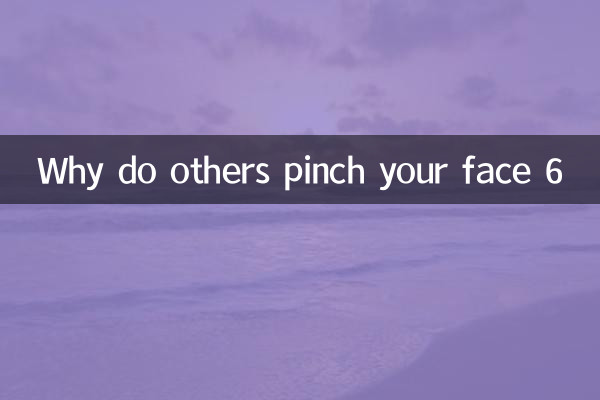Why do you get pinched by others?
On social media and in daily life, the behavior of "face pinching" seems to have become a common way of interaction. Whether it’s a joke between friends or teasing between strangers, what are the psychological and social factors hidden behind this behavior? This article will explore this phenomenon starting with recent hot topics and structured data analysis.
1. The correlation between recent hot topics on the Internet and face-pinching behavior

According to the hot data of the entire network in the past 10 days, the following are hot topics that may be related to face-pinching behavior:
| Ranking | hot topics | correlation analysis |
|---|---|---|
| 1 | Social distancing and physical contact | In the post-epidemic era, people’s desire for physical contact increases |
| 2 | Emoticon culture | The behavior of pinching faces is often made into emoticons and spread |
| 3 | Internet celebrity filter phenomenon | An overly retouched face triggers the urge to pinch |
| 4 | Workplace PUA Discussion | Some face-pinching behaviors may involve power imbalances |
| 5 | Cute culture prevails | Round facial features are more likely to trigger the urge to pinch your face |
2. Psychological interpretation of face-pinching behavior
From a psychological perspective, face-pinching behavior may stem from the following psychological mechanisms:
1.Cute Aggression: When seeing something particularly cute, some people will have a slight "aggression impulse", which is an emotion regulation mechanism.
2.tactile needs: Humans have an innate need to establish connections through touch, and the face, as one of the most accessible parts, is a natural target.
3.expression of power: In unequal relationships, face-picking may become a way for the powerful party to demonstrate dominance.
4.Confirmation of intimacy: In an intimate relationship, this slightly aggressive behavior may become a way to confirm the relationship.
3. Data statistics of face-pinching behavior in different scenarios
According to social media data analysis, face-pinching behavior mainly occurs in the following scenarios:
| scene | Proportion | Typical characteristics |
|---|---|---|
| jokes between friends and family | 62% | With laughter and gentle movements |
| express affection | twenty three% | For babies, toddlers or pets |
| workplace interaction | 8% | There is a power imbalance |
| stranger interaction | 5% | often cause controversy |
| other | 2% | - |
4. Why are some people particularly susceptible to being pinched?
Based on online discussions and expert opinions, people with the following characteristics are more likely to be targets of face-pinching:
1.facial features: Round faces, baby fat, and good skin elasticity are more likely to trigger the urge to pinch your face.
2.Character traits: People who are gentle and not good at rejection are more likely to be pinched continuously.
3.social status: People who are in a weak position in the power structure are more likely to be targeted.
4.cultural background: In some cultures, pinching your face is considered a normal act of expressing affection.
5. How to deal with face-pinching behavior that you don’t like
For those who don’t want to be pinched, consider the following strategies:
1.express clearly: Explain your discomfort directly but politely.
2.physical defense: Use your hand to block lightly or take a step back to convey a rejection signal.
3.divert attention: Change the opponent's movement trajectory by passing items etc.
4.seek support: In formal occasions such as the workplace, you can report the situation to your superiors or HR.
5.Resolve with humor: Use a joke to express rejection, such as "If you pinch again, you will be charged."
6. Cultural Differences and Face-Pinching Behavior
There are significant differences in the acceptance of face-pinching across different cultures:
| area | acceptance | Typical reaction |
|---|---|---|
| East Asia | medium | Acceptable among acquaintances, considered offensive to strangers |
| South Asia | higher | Face pinching is more common in children |
| Europe and America | lower | Mostly seen as an invasion of personal space |
| latin america | higher | Common ways to express intimacy |
| middle East | Low | Strictly prohibited between people of the opposite sex |
The seemingly simple behavior of pinching one’s face actually reflects complex social psychological and cultural differences. While enjoying intimate interactions, we should also respect the bodily autonomy of others and avoid allowing intimacy to become offensive. Understanding the psychological motivations behind behaviors can help us build healthier relationships.

check the details

check the details